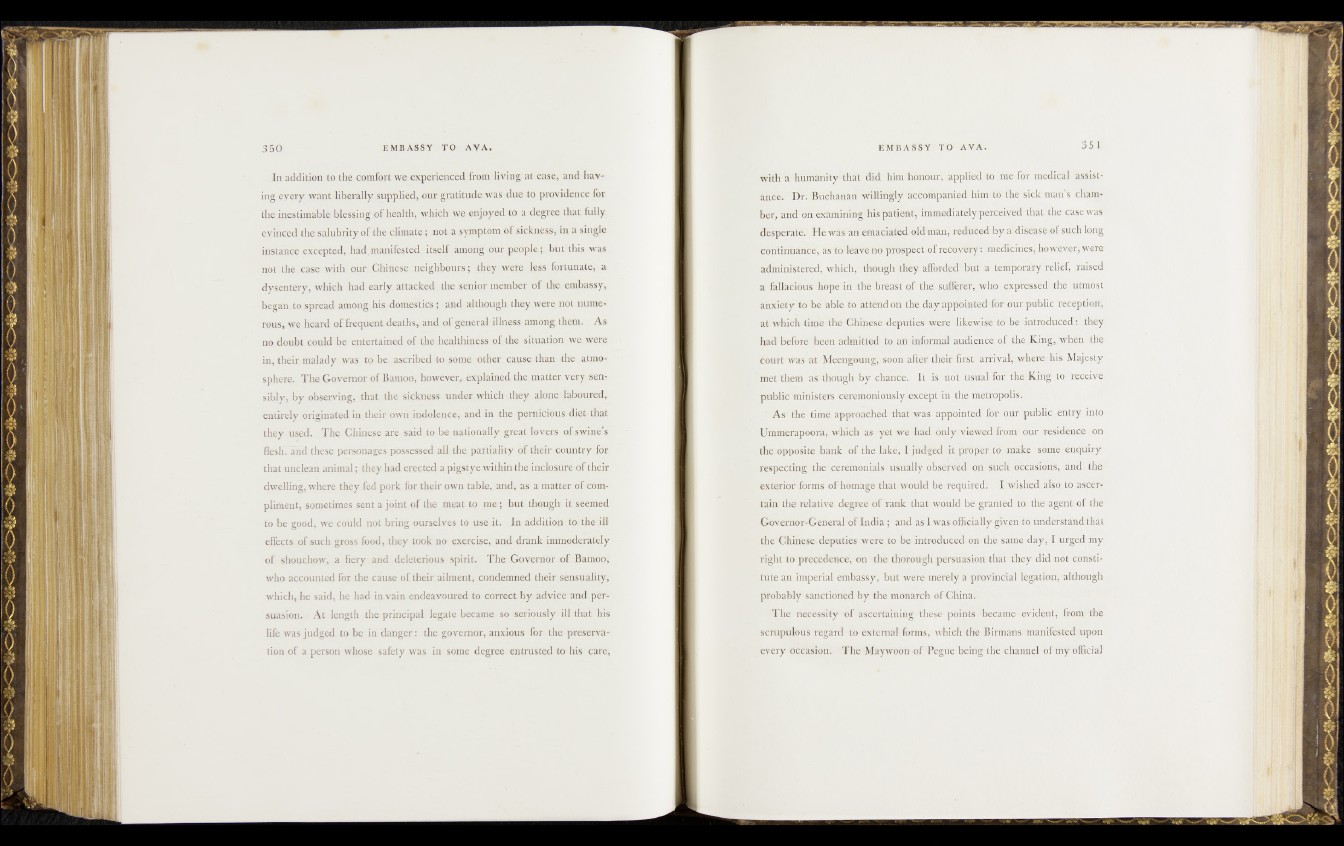
l a addition to the comfort we experienced fro.® living atre&sey and having
:eyet^ want, liberally supplied, our gratitude was due to providence for
the jnfestwaAlft blessing o f health* which we enjoyed to a degree thlfe fidhfc..
evinced the salubrityof the climate.; _ not a.symptprnbf sickness, in asingte
instance excepted, had.njanifested itself among our people; but this was
not the case with our Chinese neighbours; they were less fortunate, a
dysentery, which, had early attacked, the senior m embetof;the embassy,
began to spread among his domestics; and although they were, riot numerous,
we heard of. frequent deaths, and of general illness among them. As
no doubt could be entertained of the healthiness o f the .situation we were
in, their malady was to -be ascribed to some other cause than the atmosphere.
The Governor of Bamoo, however, explained the matter very sensibly,
by observing, that the sickness under which they alone laboured,
entirely originated in their own indolence, and in the pernicious, diet that
they used. The Chinese are said to be nationally great lovers of swine’s
flesh, and these personages possessed all the partiality of their country for
that unclean animal; they had erected apigst-ye within the. inclosure of their
dwelling, where they fed pork for their own-table, and, as a matter of compliment,
sometimes sent a joint of the meat to me; but though it seemed
to be good, we could not bring ourselves to use it. In addition to the ill
effects of such gross food, they took no exercise, and drank immoderately
of shouchow, a fiery and deleterious spirit. The Governor of Bamoo,
who accounted for the cause of their ailment, condemned their, sensuality,
which, he said, he had in vain endeavoured to correct by advice- and persuasion.
At length the principal legate became so seriously ill that his
life was judged to be in danger: the governor, anxious for the preservation
of a person whose safety was in some degree entrusted to his care;
With a h um an ity th a t Hid himihojSdkr; ^.pplibcLto anefdr medichh assist?
afrce. 'I^ f Buehahari'Willingly4fe©<^pau4ied‘fhiHi'to tW#ick man’s chasu
her, and onl«kaminingtMs,^®^nfe, immediately^erceiyed that the nasetyaif
desperate. He v/a#h®^§fi^ph^d*m'an,' red&pedfsby a’disease of such fong
'continuance, as^ieWvfem© prospect o lr t^ ^K im e d% ih e ^ how ever; were
i'adminisi c ru h .'w lu c fe tth o u g h a ffo rd e d ^ h u t a..tempocsfcy&eKf, raised
a fallacious hop© in t’hS'brlastnf the-.oafferer, who pxpaifiSsedPthe ifiSfost
anxiety'to- be able to attend orSith'e day appointed <£sr gap public reception
at which time* the Chinese deputies*.wereilrkewis’e to hedmftsdhcedu' they
fed before been admitted? to an irfbrmdfiaudi«pfob:c,L.Lhe .whdh^the
chart was at Meengouijg, *dooh ‘after theififirst awilykfa where1 bis Majesty
'riiet them as though byidiakce; It k. King
publie mfektieAieFenftswisuislyiesBBept insthe mstiopglisb
As the tina1 approached that was appointed, jt&ijfoi-ir ipublkinuti^* tjifii
H-mmerapooua, which a s yet nvevhad only viewed frpm ‘Ohruitesidiende ;ion
the'Ppj^Mte b r tk h f the lake, I judged it proper to make some «qquhjyf
respecting the ceremonials usually« ohsers^kfoS. and'. thh1
exterior forms of-homage thatlwauld bbtlaq u ^u fW l wished; also1 to< as.cgr.?
tain the relative degree of rank th a t would bejgcantedlict tiffodgent of'the
Governor-General of Indiay^StldasISviWlSttijlly'giveu to und cist and that
the 'Chinese: deputies were to be introduced. @®s thb ssahaeblay, I urged my
tight to precedence, on the thdfotfgh pdrsuasioii that they>dief «dt p a s til
tute an,imperial embassy,’-but were -merely a'-pphYstoclal-lS^tidn, although
'pdfeaMp' sanctioned by the monarch of China.
The necessity of 'ascertaining- these poibishbecanSp -evident, from' the
scrupulous regard to external forms, which the Bitmafis' manheSted.Jbphn
every occasion. The Maywoon-ef Pegue- being the channel of my official